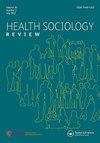“性信使”?使睾酮成为注射合成代谢雄激素类固醇的动机
IF 2.5
2区 医学
Q2 HEALTH POLICY & SERVICES
引用次数: 6
摘要
合成代谢雄激素类固醇是睾酮的合成衍生物。它们被认为是澳大利亚最常用的性能和形象增强药物(PIEDs)。然而,人们对男性使用类固醇和其他类固醇药物的动机知之甚少。在当代男子气概和性别规范的背景下,理解这些动机的既定方法强调了男性的表现和/或与形象有关的问题。研究人员很少关注睾酮的社会和政治特征如何塑造和改变类固醇的使用。相反,睾酮往往被理所当然地视为“性信使”,以可预测和常规的方式作用于身体。本文采用了不同的方法。根据女权主义科学研究和澳大利亚研究项目的访谈,我们调查了分配给睾酮的文化和象征意义如何塑造男性类固醇消费的本体论政治。将睾酮视为一种新兴的社会和生物政治聚集,而不是一种稳定的性激素,可以让我们更好地理解男性的PIED消费是如何被调节的,特别是被关于性别差异和性别生物学的普遍观点所调节的。最后,我们考虑如何更好地让服用类固醇的男性参与健康倡议,以符合他们的关切和观点。本文章由计算机程序翻译,如有差异,请以英文原文为准。
A ‘messenger of sex’? Making testosterone matter in motivations for anabolic-androgenic steroid injecting
ABSTRACT Anabolic-androgenic steroids are synthetic derivatives of testosterone. They are thought to be the most commonly used performance and image-enhancing drugs (PIEDs) in Australia. However, the motivations for men’s use of steroids and other PIEDs are poorly understood. Established ways of understanding these motivations highlight men’s performance and/or image-related concerns, in the context of contemporary masculinities and gender norms. Researchers have paid little attention to how the social and political features of testosterone shape and transform steroid use. Instead, testosterone tends to be taken for granted as a ‘messenger of sex’ that acts on the body in predictable and routinised ways. This article takes a different approach. Drawing on feminist science studies and interviews conducted for an Australian research project, we investigate how the cultural and symbolic meanings assigned to testosterone shape the ontological politics of men’s steroid consumption. Approaching testosterone as an emergent social and biopolitical gathering rather than as a stable sex hormone allows us to better understand how men’s PIED consumption is mediated, particularly by pervasive ideas about sexual difference and the biology of gender. In concluding, we consider ways of better engaging men who consume steroids in health initiatives, in keeping with their concerns and perspectives.
求助全文
通过发布文献求助,成功后即可免费获取论文全文。
去求助
来源期刊

Health Sociology Review
Multiple-
CiteScore
7.50
自引率
0.00%
发文量
14
期刊介绍:
An international, scholarly peer-reviewed journal, Health Sociology Review explores the contribution of sociology and sociological research methods to understanding health and illness; to health policy, promotion and practice; and to equity, social justice, social policy and social work. Health Sociology Review is published in association with The Australian Sociological Association (TASA) under the editorship of Eileen Willis. Health Sociology Review publishes original theoretical and research articles, literature reviews, special issues, symposia, commentaries and book reviews.
 求助内容:
求助内容: 应助结果提醒方式:
应助结果提醒方式:


